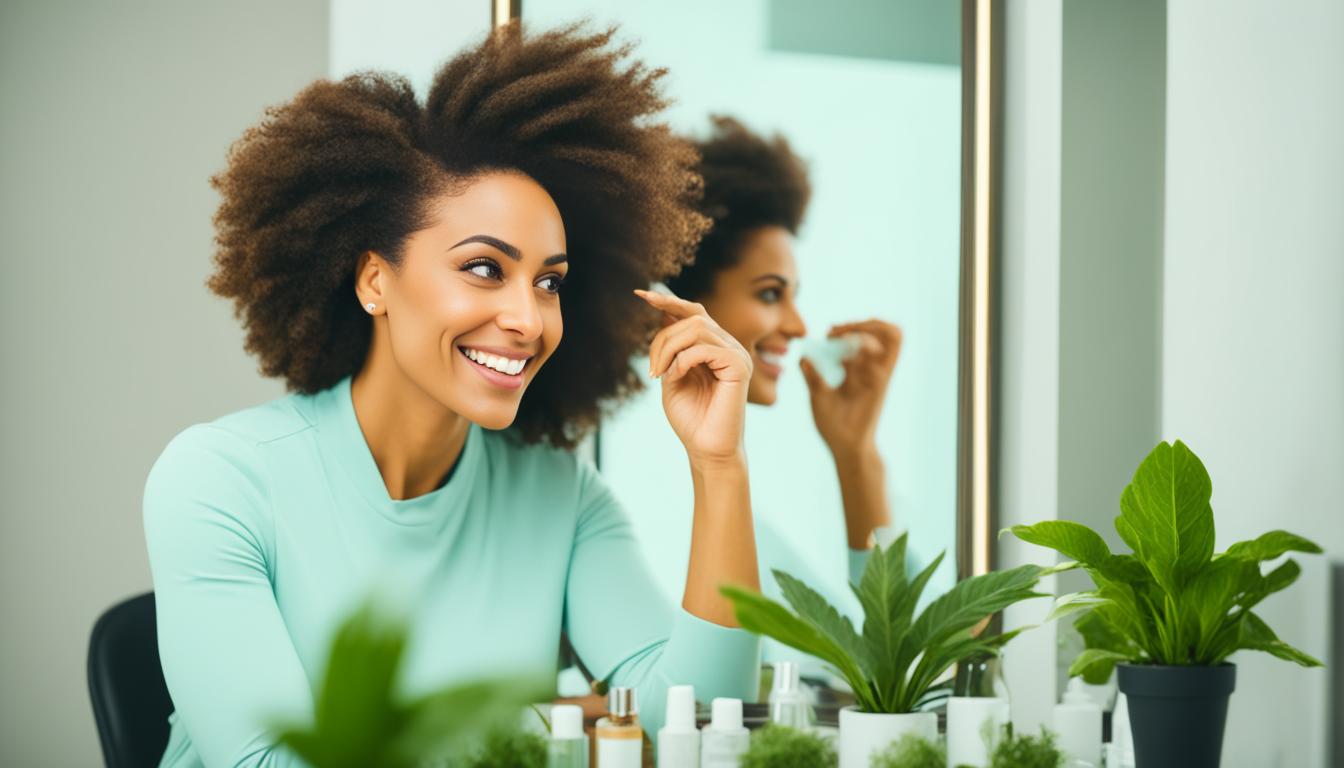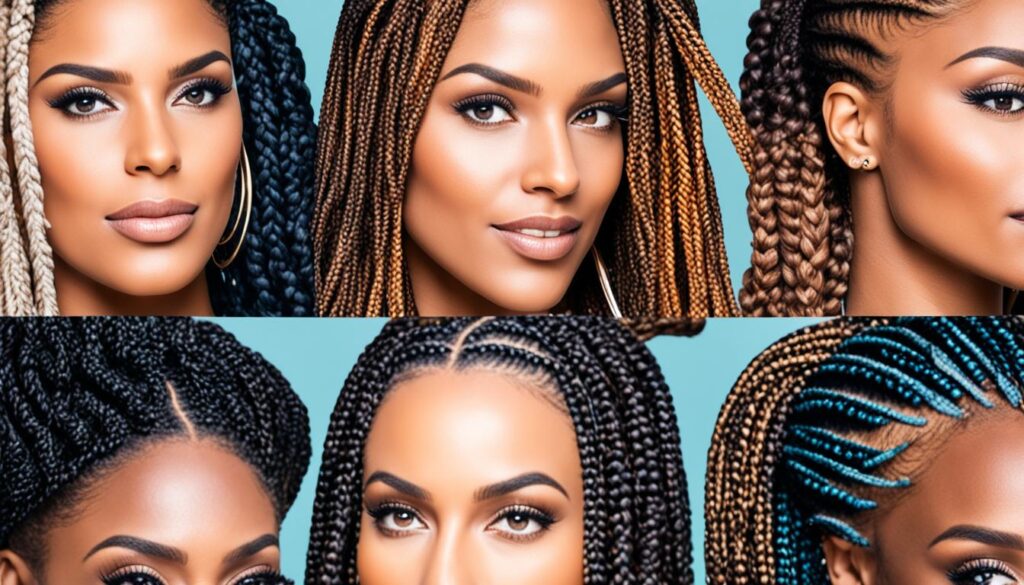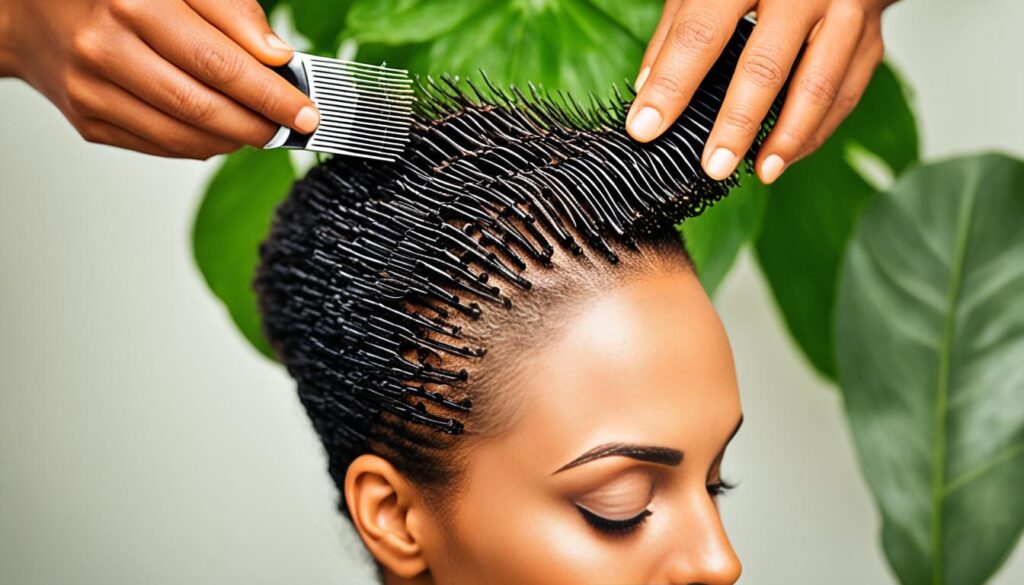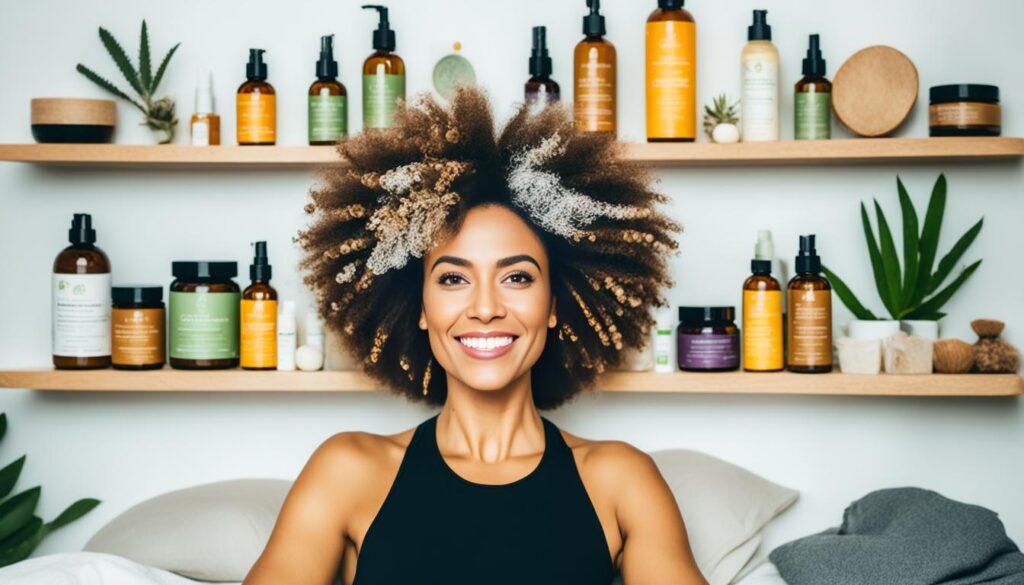
Are you tired of waiting for your African hair to grow? Do you long for longer, stronger locks that defy gravity? You’re not alone. Many individuals with African hair struggle to achieve faster hair growth due to factors like breakage and dryness. But fear not, there are tips and techniques you can try to boost hair growth naturally and see real results.
Key Takeaways:
- 1. Maintaining a balanced diet and hydration are crucial for promoting hair growth.
- 2. Protective styles like wigs, weaves, and braids can protect your hair and minimize damage.
- 3. Moisturizing your hair with natural ingredients can prevent breakage and promote growth.
- 4. Regular trimming, establishing a hair care routine, and protecting your hair at night can contribute to faster growth.
- 5. Avoiding chemical treatments can help maintain a healthy hair growth routine.
How diet and hydration affect African hair growth
A balanced diet plays a crucial role in promoting healthy hair growth for individuals with African hair. By consuming the right nutrients, you can nourish your hair follicles and enhance their growth potential. Additionally, maintaining proper hydration levels is vital to support optimal hair growth and maintain the overall health of your hair.
Here are some essential tips to improve African hair growth through diet and hydration:
1. Balanced Diet for Hair Growth
Include a variety of fruits, vegetables, and protein-rich foods in your diet. These nutrient-dense foods provide essential vitamins and minerals that aid in promoting healthy hair growth.
Key nutrients for hair growth:
- Vitamin A: Found in foods like spinach, broccoli, and sweet potatoes, vitamin A promotes a healthy scalp, which is crucial for hair growth.
- Vitamin C: This vitamin is found in fruits like oranges, strawberries, and kiwis. It aids in hair growth by facilitating iron absorption, an essential mineral for hair health.
- Protein: Foods such as eggs, fish, lean meats, almonds, and legumes stimulate amino acid and keratin production, supporting faster hair growth.
Eating a diversified and nutrient-rich diet is essential for meeting the dietary requirements necessary for healthy hair growth.
2. Importance of Hydration for Hair Growth
Proper hydration is equally important for promoting African hair growth. When you drink enough water, you support the body’s natural functions and help maintain the moisture balance in your hair and scalp.
It is recommended to drink about 2 liters or eight glasses of water per day to stay properly hydrated. This helps in preventing dryness, which can lead to brittle and breakage-prone hair. By keeping your body hydrated, you promote the overall health of your hair, making it more resilient to damage.
Remember, a balanced diet and adequate hydration are essential for promoting healthy African hair growth. They provide the necessary nutrients and moisture to support the growth and strength of your hair.
| Nutrient | Food Sources |
|---|---|
| Vitamin A | Spinach, broccoli, sweet potatoes |
| Vitamin C | Oranges, strawberries, kiwis |
| Protein | Eggs, fish, almonds, legumes |
The benefits of protective styles for African hair growth
Protective styles such as wigs, weaves, twists, and braids can be a game-changer when it comes to promoting African hair growth. These styles not only enhance the natural beauty of African hair but also offer numerous benefits for its health and length retention. Let’s explore some of the key advantages of protective styles:
1. Prevention of breakage
One of the biggest challenges for African hair is breakage. Protective styles help to safeguard the hair by keeping it tucked away and shielded from external factors that can cause damage. Harsh weather conditions, excessive manipulation, and friction from rubbing against clothing or pillowcases can all contribute to breakage. But with the right protective style, the hair is kept secure and significantly reduces the risk of breakage.
2. Moisture retention
African hair is prone to dryness, which can lead to brittleness and breakage. Protective styles help to lock in moisture and prevent moisture loss. By keeping the hair protected and tucked away, the natural oils produced by the scalp have a chance to distribute evenly throughout the hair strands, promoting hydration and reducing dryness.
3. Minimal manipulation
One of the best ways to achieve African hair growth is by minimizing manipulation. Constant styling, combing, and brushing can cause stress and tension on the hair, leading to breakage. Protective styles eliminate the need for daily manipulation, allowing the hair to rest and grow undisturbed. It also reduces the amount of time spent styling the hair, making it a low-maintenance option for those who lead busy lives.
4. Versatility and style options
Protective styles offer a wide range of options for expressing creativity and personal style. From long braids to intricate twists, there is a protective style to suit every individual’s preference. These styles can also be customized with accessories, colors, and lengths, providing endless possibilities for experimenting with different looks while keeping the hair protected.
“Protective styles offer a winning combination of hair growth and style versatility.”

By incorporating protective styles into your hair care routine, you can effectively promote African hair growth while enjoying the benefits of versatile and low-maintenance hairstyles. However, it’s essential to note that proper care and maintenance are crucial for achieving optimal results. Regular moisturizing, gentle cleansing, and protecting the hair at night with a satin bonnet or scarf are essential steps in maintaining healthy hair and maximizing the benefits of protective styles.
The importance of moisture in African hair growth
Moisture plays a crucial role in promoting healthy hair growth in African hair. Dry hair is more prone to breakage, which can hinder the progress of hair growth. To keep African hair moisturized and prevent dryness, there are several effective tips and techniques to incorporate into your hair care routine.
One of the natural ways to add moisture to African hair is by using ingredients like rosewater and manuka honey. Rosewater is known for its hydrating properties, helping to reduce frizz and add shine to the hair. Manuka honey, on the other hand, promotes scalp health and provides nourishment to the hair follicles, stimulating growth.
Another way to keep the hair moisturized is by using leave-in conditioners that contain ingredients like avocado oil. Avocado oil is rich in essential fatty acids, which provide deep moisturization to the hair and help prevent split ends and hair loss. Applying leave-in conditioners with hydrating properties can effectively retain moisture in African hair, leading to healthier and stronger hair growth.
It’s essential to establish a regular moisturizing routine for African hair. This can include applying moisturizing products, such as creams or oils, to the hair daily or as needed. Additionally, incorporating deep conditioning treatments into your routine can provide intense hydration to the hair, preventing dryness and promoting optimal hair growth.
Here are some key tips for keeping African hair moisturized:
- Use moisturizing products specifically designed for African hair.
- Avoid overwashing the hair, as frequent washing can strip away natural oils.
- Protect the hair from harsh weather conditions by wearing a hat or scarf.
- Sleep with a satin pillowcase or use a satin bonnet to prevent moisture loss.
By incorporating these practices into your hair care routine, you can ensure that your African hair stays moisturized, preventing dryness and promoting optimal hair growth.
Tips for maintaining healthy hair and preventing breakage
When it comes to promoting hair growth and preventing breakage in African hair, there are a few key tips to keep in mind. Trimming split ends regularly is an essential step in maintaining healthy hair. Split ends can lead to further breakage and damage, so by removing them, you can prevent potential issues.
Establishing a regular hair care routine is also crucial. Cleansing and conditioning your hair every 7-10 days can help keep it clean, moisturized, and strong. This routine allows you to remove any product buildup and nourish your hair with the necessary moisture and nutrients.
Regular trimming and a consistent hair care routine are essential for maintaining healthy hair and preventing breakage.
Using the right products is another key factor in maintaining healthy hair. The Curling Creme With Coconut And Jamaican Black Castor Oils is an excellent option as it helps to style the hair without compromising its definition. This versatile product provides hydration and nourishment, promoting stronger and healthier hair.
Protecting your hair at night is equally important. Using a satin bonnet or scarf can prevent moisture loss and minimize friction, reducing the risk of breakage. By keeping your hair protected while you sleep, you can maintain its moisture balance and overall health.

Tips for maintaining healthy hair and preventing breakage:
- Trim split ends regularly to prevent further breakage
- Establish a regular hair care routine, including cleansing and conditioning every 7-10 days
- Use the Curling Creme With Coconut And Jamaican Black Castor Oils to style and nourish your hair
- Protect your hair at night by using a satin bonnet or scarf
| Tip | Description |
|---|---|
| Trim split ends regularly | Prevents breakage and promotes healthy hair growth |
| Establish a regular hair care routine | Cleansing and conditioning every 7-10 days keeps hair clean and moisturized |
| Use the Curling Creme With Coconut And Jamaican Black Castor Oils | Nourishes and styles hair without compromising definition |
| Protect hair at night | Use a satin bonnet or scarf to prevent moisture loss and reduce friction |
Avoiding chemical treatments for faster African hair growth
Chemical treatments such as bleaching, perming, and relaxing can have detrimental effects on African hair, leading to damage and breakage. To achieve faster hair growth and maintain healthy hair, it is crucial to avoid these treatments and adopt a natural approach. By prioritizing a healthy hair care routine and steering clear of harsh chemicals, individuals can promote stronger, longer hair.
1. Embrace your natural texture: Instead of subjecting your hair to chemical processes, celebrate its natural beauty and work with its unique characteristics. This will help minimize damage and allow your hair to thrive.
2. Use natural products: Opt for hair care products that are free from harmful chemicals, sulfates, and parabens. Look for ingredients like shea butter, coconut oil, and argan oil, which provide natural moisture and nourishment for your hair.
3. Regularly cleanse and condition: Establish a consistent hair care routine that includes gentle cleansing and conditioning. This helps remove buildup, restore moisture, and maintain a healthy scalp.
4. Protect from excessive heat styling: Excessive heat from styling tools can weaken the hair and cause damage. Minimize the use of heat styling tools and always apply a heat protectant spray or serum before styling.
5. Avoid harsh chemical dyes: Instead of chemical dyes, explore natural alternatives like henna or vegetable-based dyes. These options can add color without compromising the health of your hair.
“By avoiding chemical treatments, individuals can nurture their hair and promote its natural growth without compromising its health.”

To illustrate the difference between chemical treatments and natural hair care, consider this comparison:
| Chemical Treatments | Natural Hair Care |
|---|---|
| Can cause damage and breakage | Promotes healthier and stronger hair |
| Requires frequent touch-ups and maintenance | Gentle and sustainable approach |
| May result in scalp irritation or allergic reactions | Uses natural ingredients that are gentle on the scalp |
By avoiding chemical treatments and adopting a holistic approach to hair care, individuals can maintain the health of their hair, prevent damage, and promote faster African hair growth.
Conclusion
To achieve faster hair growth in African hair, it is crucial to adopt healthy practices and avoid damaging treatments. By following a balanced diet, using protective styles, keeping the hair moisturized, trimming split ends, establishing a regular hair care routine, and avoiding chemical treatments, individuals can promote healthier and longer hair.
Maintaining a balanced diet that includes fruits, vegetables, and protein-rich foods provides the necessary nutrients for hair growth. Additionally, drinking enough water ensures proper hydration, which is essential for maintaining healthy hair.
Using protective styles such as wigs, weaves, twists, and braids not only protect the hair from harsh weather conditions but also minimize damage and reduce breakage caused by friction and manipulation. Moisturizing the hair regularly with natural ingredients like rosewater and manuka honey helps prevent dryness, frizz, and breakage.
Establishing a regular hair care routine, including trimming split ends and protecting the hair at night, plays a significant role in maintaining healthy hair and preventing breakage. Furthermore, avoiding chemical treatments like bleaching, perming, and relaxing helps minimize damage to the hair, promoting faster growth and overall hair health.
It is important to remember that achieving faster hair growth in African hair requires consistency and patience. Hair growth takes time, but by implementing these tips and practices, individuals can achieve their desired hair length and enjoy healthier, stronger hair.






